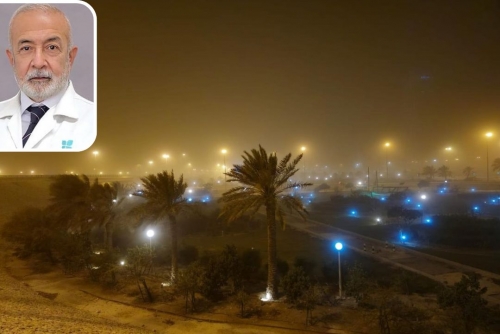Health warning issued as dust storms sweep Bahrain
TDT | Manama
Email: mail@newsofbahrain.com
A medical expert has warned of potential health risks posed by the ongoing dust storms across the Kingdom of Bahrain, urging the public — especially those with respiratory conditions — to take precautionary measures.
Professor Mohamed Abdel Ghaffar, a chest diseases consultant and Professor of Chest Diseases and Critical Care at Al-Kindi Hospital, said the current weather conditions could trigger serious respiratory issues in both healthy individuals and those with pre-existing conditions.
“Dust inhalation increases the risk of respiratory infections. Patients with asthma are particularly vulnerable, and even healthy individuals may experience breathing difficulties or infections due to high dust exposure,” he said.
The warning follows a statement from the Meteorology Department confirming that the dust mass, which on early morning yesterday entered the Kingdom, has begun to move away.
However, strong northwesterly winds — expected to persist until Friday — may still cause local dust storms and keep airborne particles suspended in the atmosphere.
Winds are forecast to range between 18 to 23 knots, occasionally reaching up to 30 knots during the day, according to the official weather bulletin.
Temperatures have slightly decreased, with a high of 31°C and a low of 25°C expected today.
Prof. Abdel Ghaffar noted a recent spike in emergency room visits linked to asthma attacks and breathing issues, which he attributed to increased dust exposure.
He also highlighted a rise in bronchitis cases accompanied by coughing fits, especially in individuals exposed to dust, cold air, or strong odors.
“Those with such symptoms should avoid dust exposure to prevent worsening their condition,” he advised.
To reduce health risks, he recommended limiting outdoor activities unless absolutely necessary and taking measures to prevent dust from entering homes.
Simple protective steps — such as wearing face masks, covering the nose and mouth with a ghutra or shemagh, or using a hijab — can be effective in minimising inhalation of dust particles.
“Prevention is always better than cure,” Prof. Abdel Ghaffar said. “Taking precautions during dust storms can significantly lower the risk of respiratory complications.”
Related Posts

